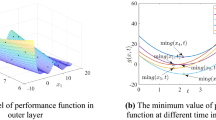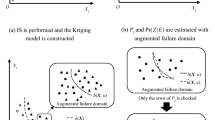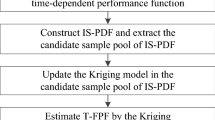Abstract
Time-dependent reliability analysis (TRA) has attracted widespread attention due to its viability in evaluating the reliability of structures during the entire service life. However, TRA for complicated structures often leads to extremely high computational cost. To alleviate computational burden, this study develops a most probable point (MPP)-oriented Kriging model combined with the importance sampling (MPP-KIS) method for TRA. The strategy is that a comprehensive Kriging modeling method based on MPP is developed to construct the surrogate models for instantaneous performance functions discretized from the time-dependent reliability problem. A new learning function and a precise stopping criterion that take into account of the accuracy of the Kriging around MPP are contrived for updating the surrogate models. An adaptive screening strategy is introduced to identify the safe time trajectories to spare calculating the responses. The importance sampling method is integrated with the adaptive screening strategy for efficient computation of the time-dependent probability of failure. Two numerical examples and two engineering cases are exemplified to demonstrate the effectiveness and proficiency of the proposed method. The results show that the proposed MPP-KIS method achieves reliable results with substantially improved computational efficiency.


















Similar content being viewed by others
References
Andrieu-Renaud C, Sudret B, Lemaire M (2004) The PHI2 method: a way to compute time-variant reliability. Reliab Eng Syst Saf 84:75–86. https://doi.org/10.1016/j.ress.2003.10.005
Chen J, Li E, Li Q, Hou S, Han X (2022) Crashworthiness and optimization of novel concave thin-walled tubes. Compos Struct 283:115109. https://doi.org/10.1016/j.compstruct.2021.115109
Gavin HP, Yau SC (2008) High-order limit state functions in the response surface method for structural reliability analysis. Struct Saf 30:162–179. https://doi.org/10.1016/j.strusafe.2006.10.003
Gong C, Frangopol DM (2019) An efficient time-dependent reliability method. Struct Saf 81:101864. https://doi.org/10.1016/j.strusafe.2019.05.001
Guo Q, Liu Y, Chen B, Zhao Y (2020) An active learning Kriging model combined with directional importance sampling method for efficient reliability analysis. Probab Eng Mech 60:103054. https://doi.org/10.1016/j.probengmech.2020.103054
Guo Q, Zhai H, Suo B, Zhao W, Liu Y (2023) Time-variant reliability global sensitivity analysis with single-loop Kriging model combined with importance sampling. Probab Eng Mech 72:103441. https://doi.org/10.1016/j.probengmech.2023.103441
Hu Z, Du X (2013a) A sampling approach to extreme value distribution for time-dependent reliability analysis. J Mech Des 135:071003. https://doi.org/10.1115/1.4023925
Hu Z, Du X (2013b) Time-dependent reliability analysis with joint upcrossing rates. Struct Multidisc Optim 48:893–907. https://doi.org/10.1007/s00158-013-0937-2
Hu Z, Du X (2015) Mixed efficient global optimization for time-dependent reliability analysis. J Mech Des 137:051401. https://doi.org/10.1115/1.4029520
Hu Z, Mahadevan S (2016) A single-loop Kriging surrogate modeling for time-dependent reliability analysis. J Mech Des 138:061406. https://doi.org/10.1115/1.4033428
Ji Y, Liu H, Xiao N, Zhan H (2023) An efficient method for time-dependent reliability problems with high-dimensional outputs based on adaptive dimension reduction strategy and surrogate model. Eng Struct 276:115393. https://doi.org/10.1016/j.engstruct.2022.115393
Jiang C, Huang X, Han X, Zhang D (2014) A time-variant reliability analysis method based on stochastic process discretization. J Mech Des 136:091009. https://doi.org/10.1115/1.4027865
Jiang C, Wei X, Huang Z, Liu J (2017) An outcrossing rate model and its efficient calculation for time-dependent system reliability analysis. J Mech Des 139:041402. https://doi.org/10.1115/1.4035792
Jiang C, Wei X, Wu B, Huang Z (2018) An improved TRPD method for time-variant reliability analysis. Struct Multidisc Optim 58:1935–1946. https://doi.org/10.1007/s00158-018-2002-7
Jiang C, Wang D, Qiu H, Gao L, Chen L, Yang Z (2019) An active failure-pursuing Kriging modeling method for time-dependent reliability analysis. Mech Syst Signal Process 129:112–129. https://doi.org/10.1016/j.ymssp.2019.04.034
Jiang C, Qiu H, Gao L, Wang D, Yang Z, Chen L (2020) Real-time estimation error-guided active learning Kriging method for time-dependent reliability analysis. Appl Math Model 77:82–98. https://doi.org/10.1016/j.apm.2019.06.035
Jiang C, Yan Y, Wang D, Qiu H, Gao L (2021) Global and local Kriging limit state approximation for time-dependent reliability-based design optimization through wrong-classification probability. Reliab Eng Syst Saf 208:107431. https://doi.org/10.1016/j.ress.2021.107431
Li M, Wang Z (2020) An LSTM-based ensemble learning approach for time-dependent reliability analysis. J Mech Des 143:031702. https://doi.org/10.1115/1.4048625
Li M, Wang Z (2022) LSTM-augmented deep networks for time-variant reliability assessment of dynamic systems. Reliab Eng Syst Saf 217:108014. https://doi.org/10.1016/j.ress.2021.108014
Liu H, Li S, Huang X (2022) Adaptive surrogate model coupled with stochastic configuration network strategies for time-dependent reliability assessment. Probab Eng Mech 71:103406. https://doi.org/10.1016/j.probengmech.2022.103406
Lophaven SN, Nielsen HB, Søndergaard J (2002) DACE-A Matlab Kriging toolbox, version 2.0.
Meng Z, Zhao J, Jiang C (2021) An efficient semi-analytical extreme value method for time-variant reliability analysis. Struct Multidisc Optim 64:1–12. https://doi.org/10.1007/s00158-021-02934-y
Meng Z, Qian Q, Xu M, Yu B, Yıldız AR, Mirjalili S (2023) PINN-FORM: A new physics-informed neural network for reliability analysis with partial differential equation. Comput Methods Appl Mech Eng 414:116172. https://doi.org/10.1016/j.cma.2023.116172
Pan Q, Dias D (2017) An efficient reliability method combining adaptive support vector machine and Monte Carlo simulation. Struct Saf 67:85–95. https://doi.org/10.1016/j.strusafe.2017.04.006
Qian H-M, Li Y-F, Huang H-Z (2020) Time-variant reliability analysis for industrial robot RV reducer under multiple failure modes using Kriging model. Reliab Eng Syst Saf 199:106936. https://doi.org/10.1016/j.ress.2020.106936
Rice S (1945) Mathematical analysis of random noise-conclusion. Bell Syst Tech J 24:46–156. https://doi.org/10.1002/j.1538-7305.1944.tb00874.x
Rocco CM, Moreno JA (2002) Fast Monte Carlo reliability evaluation using support vector machine. Reliab Eng Syst Saf 76:237–243. https://doi.org/10.1016/S0951-8320(02)00015-7
Roussouly N, Petitjean F, Salaun M (2013) A new adaptive response surface method for reliability analysis. Probab Eng Mech 32:103–115. https://doi.org/10.1016/j.probengmech.2012.10.001
Shi M, Lv L, Sun W, Song X (2020) A multi-fidelity surrogate model based on support vector regression. Struct Multidisc Optim 61:2363–2375. https://doi.org/10.1007/s00158-020-02522-6
Song Z, Zhang H, Zhang L, Liu Z, Zhu P (2022) An estimation variance reduction-guided adaptive Kriging method for efficient time-variant structural reliability analysis. Mech Syst Signal Process 178:109322. https://doi.org/10.1016/j.ymssp.2022.109322
Song Z, Zhang H, Liu Z, Zhu P (2023) A two-stage Kriging estimation variance reduction method for efficient time-variant reliability-based design optimization. Reliab Eng Syst Saf 237:109339. https://doi.org/10.1016/j.ress.2023.109339
Sudret B (2008) Analytical derivation of the outcrossing rate in time-variant reliability problems. Struct Infrastruct Eng 4:353–362. https://doi.org/10.1080/15732470701270058
Wang Z, Chen W (2016) Time-variant reliability assessment through equivalent stochastic process transformation. Reliab Eng Syst Saf 152:166–175. https://doi.org/10.1016/j.ress.2016.02.008
Wang Z, Chen W (2017) Confidence-based adaptive extreme response surface for time-variant reliability analysis under random excitation. Struct Saf 64:76–86. https://doi.org/10.1016/j.strusafe.2016.10.001
Wang Z, Zhang X, Huang H, Mourelatos ZP (2016) A simulation method to estimate two types of time-varying failure rate of dynamic systems. J Mech Des 138:121404. https://doi.org/10.1115/1.4034300
Wang Z, Liu J, Yu S (2020) Time-variant reliability prediction for dynamic systems using partial information. Reliab Eng Syst Saf 195:106756. https://doi.org/10.1016/j.ress.2019.106756
Wu H, Du X (2023) Time- and space-dependent reliability-based design with envelope method. J Mech Des 145:031708. https://doi.org/10.1115/1.4056599
Wu H, Hu Z, Du X (2020a) Time-dependent system reliability analysis with second-order reliability method. J Mech Des 143:031101. https://doi.org/10.1115/1.4048732
Wu H, Zhu Z, Du X (2020b) System reliability analysis with autocorrelated Kriging predictions. J Mech Des 142:101702. https://doi.org/10.1115/1.4046648
Yang M, Zhang D, Han X (2020) New efficient and robust method for structural reliability analysis and its application in reliability-based design optimization. Comput Methods Appl Mech Eng 366:113018. https://doi.org/10.1016/j.cma.2020.113018
Yang M, Zhang D, Cheng C, Han X (2021) Reliability-based design optimization for RV reducer with experimental constraint. Struct Multidiscip Optim 63:2047–2064. https://doi.org/10.1007/s00158-020-02781-3
Yang M, Zhang D, Wang F, Han X (2022a) Efficient local adaptive Kriging approximation method with single-loop strategy for reliability-based design optimization. Comput Methods Appl Mech Eng 390:114462. https://doi.org/10.1016/j.cma.2021.114462
Yang Y, Peng J, Cai CS, Zhou Y, Wang L, Zhang J (2022b) Time-dependent reliability assessment of aging structures considering stochastic resistance degradation process. Reliab Eng Syst Saf 217:108105. https://doi.org/10.1016/j.ress.2021.108105
Yang M, Zhang D, Jiang C, Wang F, Han X (2024) A new solution framework for time-dependent reliability-based design optimization. Comput Methods Appl Mech Eng 418:116475. https://doi.org/10.1016/j.cma.2023.116475
Yu S, Li Y (2021) Active learning Kriging model with adaptive uniform design for time-dependent reliability analysis. IEEE Access 9:91625–91634. https://doi.org/10.1109/ACCESS.2021.3091875
Yu S, Wang Z, Li Y (2022) Time and space-variant system reliability analysis through adaptive Kriging and weighted sampling. Mech Syst Signal Process 166:108443. https://doi.org/10.1016/j.ymssp.2021.108443
Zafar T, Zhang Y, Wang Z (2020) An efficient Kriging based method for time-dependent reliability based robust design optimization via evolutionary algorithm. Comput Methods Appl Mech Eng 372:113386. https://doi.org/10.1016/j.cma.2020.113386
Zhang Y, Kiureghian AD (1995) Two improved algorithms for reliability analysis. In: Rackwitz R, Augusti G, Borri A (eds) Reliability and optimization of structural systems. Springer, Boston, pp 297–304
Zhang D, Zhou P, Jiang C, Yang M, Han X, Li Q (2021a) A stochastic process discretization method combing active learning Kriging model for efficient time-variant reliability analysis. Comput Methods Appl Mech Eng 384:113990. https://doi.org/10.1016/j.cma.2021.113990
Zhang Y, Gong C, Li C (2021b) Efficient time-variant reliability analysis through approximating the most probable point trajectory. Struct Multidisc Optim 63:289–309. https://doi.org/10.1007/s00158-020-02696-z
Zhang K, Chen N, Zeng P, Liu J, Beer M (2022) An efficient reliability analysis method for structures with hybrid time-dependent uncertainty. Reliab Eng Syst Saf 228:108794. https://doi.org/10.1016/j.ress.2022.108794
Zhang X, Lu Z, Zhao Y (2023) The GCO method for time-dependent structural reliability assessment. J Eng Mech 149:04022086. https://doi.org/10.1061/(ASCE)EM.1943-7889.0002178
Zhao Q, Wu T, Hong J (2022a) An envelope-function-based algorithm for time-dependent reliability analysis of structures with hybrid uncertainties. Appl Math Model 110:493–512. https://doi.org/10.1016/j.apm.2022.06.007
Zhao Z, Lu Z, Zhang X, Zhao Y (2022b) A nested single-loop Kriging model coupled with subset simulation for time-dependent system reliability analysis. Reliab Eng Syst Saf 228:108819. https://doi.org/10.1016/j.ress.2022.108819
Zhao Z, Zhao Y, Li P (2022c) A novel decoupled time-variant reliability-based design optimization approach by improved extreme value moment method. Reliab Eng Syst Saf 229:108825. https://doi.org/10.1016/j.ress.2022.108825
Zhou F, Hou Y, Nie H (2022) On high-dimensional time-variant reliability analysis with the maximum entropy principle. Int J Aerosp Eng 2022:6612864. https://doi.org/10.1155/2022/6612864
Funding
The authors would like to acknowledge the financial supports from the Major Project of Science and Technology Innovation 2030 (Grant No. 2021ZD0113100), the National Natural Science Foundation of China (Grant No. 52275244, Grant No. 52305256), the China Scholarship Council (No. 202106130082), and the Foundation for Innovative Research Groups of the Natural Science Foundation of Hebei Province (Grant No. E2020202142).
Author information
Authors and Affiliations
Corresponding author
Ethics declarations
Conflict of interest
The authors declare that the research contents reported in this paper inflict no conflict of interest.
Replication of results
The code and data for calculations of the results in this paper will be made available upon request.
Additional information
Responsible Editor: Zhen Hu
Publisher's Note
Springer Nature remains neutral with regard to jurisdictional claims in published maps and institutional affiliations.
Rights and permissions
Springer Nature or its licensor (e.g. a society or other partner) holds exclusive rights to this article under a publishing agreement with the author(s) or other rightsholder(s); author self-archiving of the accepted manuscript version of this article is solely governed by the terms of such publishing agreement and applicable law.
About this article
Cite this article
Zhao, Y., Zhang, D., Yang, M. et al. On efficient time-dependent reliability analysis method through most probable point-oriented Kriging model combined with importance sampling. Struct Multidisc Optim 67, 6 (2024). https://doi.org/10.1007/s00158-023-03721-7
Received:
Revised:
Accepted:
Published:
DOI: https://doi.org/10.1007/s00158-023-03721-7




